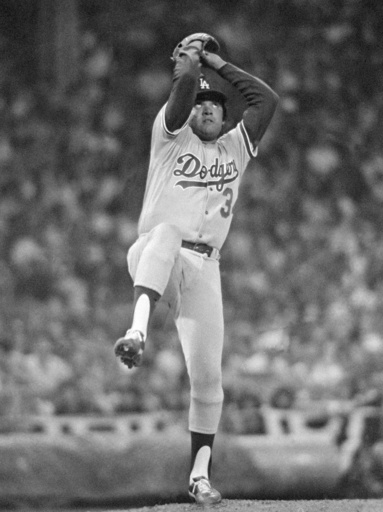
For enthusiasts of baseball, “Fernandomania” was a brief but dazzling moment that celebrated the emergence of an extraordinary talent within one of the sport’s most revered franchises.
However, for Mexicans and Mexican Americans, Fernando Valenzuela embodied something much deeper: a source of inspiration, pride, and hope.
Valenzuela, who rose to fame as a Mexican-born pitching star with the Los Angeles Dodgers, passed away Tuesday evening at a Los Angeles hospital, as confirmed by the team. He was 63 years old.
In the wake of his passing, many reflect fondly on watching the left-handed pitcher from home with their families—not solely due to a passion for the sport, but because of the enduring sense of Mexican and Latino pride he represented. His journey opened opportunities for future generations and significantly influenced Latino culture in sports.
Emerging from modest beginnings as the youngest of twelve siblings in Mexico, Valenzuela’s remarkable achievements on the mound made him an iconic figure in the Latino community, drawing new fans to Major League Baseball. Even after he retired, his legacy continued to resonate with many.
Arturo Angel, a Mexican journalist, noted that almost everyone in Mexico recognizes Valenzuela’s name. Born in 1983, he acknowledged that knowledge of the pitcher came from conversations with his father, who is not particularly interested in sports. The way Valenzuela was revered made it clear to Angel just how much of an idol he was for many people.
Nathaly Morga, who learned about Valenzuela through her parents, stated that despite the growing presence of other Latino players in Major League Baseball, “Fernando was always the big one, like the God.”
Angel mentioned that the surge of television popularity in the 1980s and the broadcasting of Dodgers games in Mexico propelled Valenzuela into stardom. The Dodgers had been airing games in Spanish since 1959 and saw an increase in ratings and interest in expanding their radio presence in Mexico once Valenzuela emerged. Following his career, he even joined the Dodgers’ broadcasts as a color commentator.
“The LA Dodgers boast a strong fan base in Mexico,” Angel explained. “The taste for baseball expanded in Mexico due to Fernando Valenzuela.”
Morga mentioned her upbringing in Tijuana, where her family favored soccer, yet they all knew about Valenzuela. She recalls her mother, unfamiliar with baseball rules, watching Dodgers games at a local diner simply to cheer on Valenzuela when he pitched.
The Dodgers had been in search of a player to resonate with LA’s Latino community, and Valenzuela’s impact dramatically altered a fan base that had previously been predominantly white. His starts drew many Mexican fans to Dodger Stadium. In 1978, the Dodgers became the first team to attract 3 million fans, but during Valenzuela’s home games, they averaged 48,430 attendees, and the overall average in the strike-shortened 1981 season was also notably high. That same year, Valenzuela made history by winning both the Rookie of the Year and Cy Young Awards in the same season.
“In Mexico, everybody knows him,” Morga said. “Everyone loves the Dodgers because of him.”
Rob Martinez expressed that for those growing up in Mexico, Valenzuela was an essential figure in their lives. With games regularly aired in Mexico, he became a central topic of conversation and a figure to admire.
Watching Valenzuela play was often a communal experience. Martinez describes family cookouts during games with friends and family, stating that when Valenzuela was taken out, the viewing would stop.
Seeing him on TV encouraged Martinez, making him believe that pursuing his dreams was within reach. He has played baseball since the age of 3 and serves now as the associate head coach and recruiting coordinator for the University of Texas Rio Grande Valley’s baseball team.
“Watching him compete was significant for everyone,” Martinez shared. “It instilled hope in us.”
Valenzuela is widely regarded as one of Mexico’s greatest athletes, alongside notable figures like soccer star Hugo Sánchez and boxer Julio César Chávez.
His journey from the small town of Etchohuaquila in Sonora, Mexico, to becoming a recognized star in the U.S. was an extraordinary feat. As the youngest child in a large family, he often played baseball alongside his older brothers, and his story inspired countless athletes.
Martinez noted that Valenzuela’s achievements showed him that success was possible, regardless of height or physical stature.
“In baseball, you don’t need to be 6-foot-3 or weigh 240 pounds to excel,” he stated. “Hard work can take you far, and that was pivotal for us in believing that we could succeed.”
In 2013, while living in California, Morga had a memorable encounter with Valenzuela at Petco Park in San Diego.
“He invited me to sit with him,” Morga recalled. “It was surreal because he was a figure my parents revered, like an idol, and here he was, just like any typical Mexican dad.”
Angel articulated that through recent profiles and discussions around Valenzuela following his passing, he appreciates not only Valenzuela’s prowess as a baseball player but also his role as a cultural ambassador during a time when race relations were viewed differently than today.
“The fact that we recognize him, even not being baseball fans, illustrates his immense significance,” Angel asserted. “While younger generations may see more representation across various sports, for that era, Valenzuela was a defining figure.”
